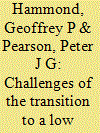|
|
|
Sort Order |
|
|
|
Items / Page
|
|
|
|
|
|
|
| Srl | Item |
| 1 |
ID:
117232


|
|
|
|
|
| Publication |
2013.
|
| Summary/Abstract |
This paper describes initial analysis of branching points on a set of transition pathways to a UK low carbon electricity future by 2050. As described in other papers in this special issue, we are exploring and analysing a set of core transition pathways, based on alternative governance patterns in which the 'logics' of market actors, government actors and civil society actors, respectively dominate. This core pathway analysis is enhanced by analyses of branching points within and across the pathways, which informs how competition between different logics plays out at key decision points. Branching points are defined as key decision points at which choices made by actors, in response to internal or external stresses or triggers, determine whether and in what ways the pathway is followed. A set of initial branching points for our three core transition pathways is identified through project and stakeholder workshops, and drawing on analysis of actors' choices and responses at past branching points in energy system transitions. The potential responses of the actors are identified at these branching points, and risk mitigation strategies are formulated for the dominant actors to reinforce that pathway, as well as opportunities for actors to move away from the pathway.
|
|
|
|
|
|
|
|
|
|
|
|
|
|
|
|
| 2 |
ID:
117220


|
|
|
|
|
| Publication |
2013.
|
| Summary/Abstract |
Electricity generation presently contributes approximately 30% of United Kingdom (UK) carbon dioxide (CO2) emissions (Alderson et al., 2012 and Parliamentary, 2007), the principal 'greenhouse gas' (GHG) having an atmospheric residence time of about 100 years (Hammond, 2000). This share mainly arises from the use of fossil fuel (coal and natural gas) combustion for this purpose. Changes in atmospheric concentrations of GHGs affect the energy balance of the global climate system. Human activities have led to quite dramatic increases since 1950 in the 'basket' of GHGs incorporated in the Kyoto Protocol; concentrations have risen from 330 ppm to about 430 ppm currently (IPCC, 2007). Prior to the first industrial revolution in the 18th Century the atmospheric concentration of 'Kyoto gases' was only some 270 ppm. The cause of the observed rise in global average near-surface temperatures over the second half of the 20th Century has been a matter of dispute and controversy. But the most recent (2007) scientific assessment by the Intergovernmental Panel on Climate Change (IPCC) states with 'very high confidence' that humans are having a significant impact on the global warming (IPCC, 2007). They argue that GHG emissions from human activities trap long-wave thermal radiation from the Earth's surface in the atmosphere (not strictly 'greenhouse' phenomena), and that these are the main cause of rises in climatic temperatures. In order to mitigate anthropogenic climate change, the Royal Commission on Environmental Pollution in the UK (RCEP, 2000) recommended at the turn of the Millennium a 60% cut in UK CO2 emissions by 2050. The British Government subsequently set a tougher, legally binding target of reducing the nation's CO2 emissions overall by 80% by 2050 in comparison to a 1990 baseline ( Department of Trade and Industry [DTI], 2007 and Climate, 2008).
|
|
|
|
|
|
|
|
|
|
|
|
|
|
|
|
| 3 |
ID:
117222


|
|
|
|
|
| Publication |
2013.
|
| Summary/Abstract |
The paper aims to inform historically the analyses of future sociotechnical transition pathways in the electricity sector, particularly those developed by the Transition Pathways to a Low Carbon Economy project. It also aims to inform the theoretical approach to transitions by focusing on key decisions at 'branching points' that led to transitions in the UK gas energy services regime, which occurred under different governance patterns. The first historical case study covers the market-led transformation of the manufactured gas regime from 1877 to 1914, which developed the end-uses of gas beyond lighting to include cooking, and extended access to working class consumers. The second case study covers the period from 1948 to 1977, historically reconstructing the transition from town gas to natural gas. This state-led and coordinated conversion to natural gas was preceded by a period of destabilisation of the manufactured gas regime, the co-existence of several niche technologies and the hybridisation of the key actors and technological infrastructures of the incumbent regime. Comparing the cases provides insights for future energy service transitions by addressing the significance of power, trust and networking in the decision making processes involved in the governance of energy transitions.
|
|
|
|
|
|
|
|
|
|
|
|
|
|
|
|
| 4 |
ID:
116699


|
|
|
|
|
| Publication |
2012.
|
| Summary/Abstract |
Recent efforts to promote a transition to a low carbon economy have been influenced by suggestions that a low carbon transition offers challenges and might yield economic benefits comparable to those of the previous industrial revolutions. This paper examines these arguments and the challenges facing a low carbon transition, by drawing on recent thinking on the technological, economic and institutional factors that enabled and sustained the first (British) industrial revolution, and the role of 'general purpose technologies' in stimulating and sustaining this and subsequent industrial transformation processes that have contributed to significant macroeconomic gains. These revolutions involved profound, long drawn-out changes in economy, technology and society; and although their energy transitions led to long-run economic benefits, they took many decades to develop. To reap significant long-run economic benefits from a low carbon transition sooner rather than later would require systemic efforts and incentives for low carbon innovation and substitution of high-carbon technologies. We conclude that while achieving a low carbon transition may require societal changes on a scale comparable with those of previous industrial revolutions, this transition does not yet resemble previous industrial revolutions. A successful low carbon transition would, however, amount to a different kind of industrial revolution.
|
|
|
|
|
|
|
|
|
|
|
|
|
|
|
|
| 5 |
ID:
116688


|
|
|
|
|
| Publication |
2012.
|
| Summary/Abstract |
This introduction to the special issue on past and prospective energy transitions presents some insights from research into past energy transitions of relevance for a possible transition to a low carbon economy. It also provides a synthesis of insights generated during a workshop attended by many of the leading researchers on this topic at Cardiff University in April 2011. The final section introduces the articles in the special issue. It is hoped that the workshop and this issue will help to move forwards the integration of the exciting research on past energy transitions in ways that will also offer valuable insights into the challenges of prospective low carbon transitions.
|
|
|
|
|
|
|
|
|
|
|
|
|
|
|
|
| 6 |
ID:
116729


|
|
|
|
|
| Publication |
2012.
|
| Summary/Abstract |
Whole system models for the GB electricity system suggest that distributed electricity storage has the potential to significantly reduce the system integration cost for future system scenarios. From a policy perspective, this poses the question why this value should not be realised within existing market structures. Opinion among stakeholders is divided. Some believe that storage deployment constitutes a 'special case' in need of policy support. Others insist that markets can provide the necessary platform to negotiate contracts, which reward storage operators for the range of services they could provide. This paper seeks to inform this debate with a process of stakeholder engagement using a perspective informed by socio-technical transition literatures.
This approach allows the identification of tensions among actors in the electricity system and of possibilities for co-evolution in the deployment of storage technologies during a transition towards a low carbon electricity system. It also draws attention to policy-related challenges of technology lock-in and path dependency resulting from poor alignment of incumbent regimes with the requirements for distributed electricity storage.
|
|
|
|
|
|
|
|
|
|
|
|
|
|
|
|
|
|
|
|
|